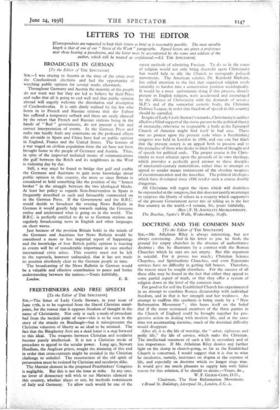DOCTRINE AND THE COMMON MAN
[To the Editor of THE SPECTATOR]
AtheLstan Riley is always interesting, but not always convincing. And in his letter to you he finds the ground for empty churches in the absence of authoritative doctrine ; this he illustrates by a contrast with the Roman Churches which he says are not empty. But this argument is suicidal. For it proves too much ; Christian Science Churches, and Spiritualistic Churches, and even Esperanto services have no difficulty in getting full houses. Therefore, the reason must be sought elsewhere. For the success of all these alike may be found in the fact that either they appeal to some partial aspect of truth, or that they offer a system of religion down to the level of the common man.
For good or for evil the Established Church has experimented in an attempt to combine Roman dictatorship with individual freedom, and in that is her strength and her weakness. An attempt to reaffirm this synthesis is being made by a " New Reformation Movement " ; this bases itself on the belief that if the more restrained members of the three parties in the Church of England could be brought together for pro- gressive action in dealing with modern life, and at the same time not accentuating doctrine, much of the doctrinal difficulty would disappear.
After all, it is the life of worship, the " sober, righteous and godly life," the life of service, which make the Christian. The intellectual statement of such a life is secondary and of less importance. If Mr. Athelstan Riley desires any further light on the slump in church-going, so far as the Established Church is concerned, I would suggest that it is due to what he inculcates, namely, insistence on dogma at the expense of life, and especially on doctrine which -no longer rings true. It would give me much pleasure to supply him with fuller reason for this solution, if he should so desire.—Yours, &c.,
W. F. GEIKIE-COBB, D.D.,
Chairman, The New Reformation Movement.
z Broad St. Buildings, Liverpool St., London, E.G. 2.














































 Previous page
Previous page